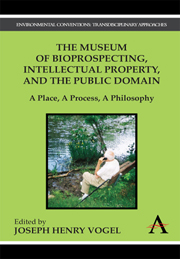 The Museum of Bioprospecting, Intellectual Property, and the Public Domain
The Museum of Bioprospecting, Intellectual Property, and the Public Domain Book contents
- Frontmatter
- Contents
- List of Figures
- Preface
- Acknowledgements
- Introduction: The Bauplan
- Chapter 1 Looking the Gorgon in the Face
- Chapter 2 Museums as Venues for Polemics
- Chapter 3 The Museum as a Vehicle for Considered Judgments on Access and Benefit Sharing
- Chapter 4 Clearing the Air: Applying the Intellectual Property Framework to National, Community, and Individual Rights in The Convention on Biological Diversity
- Chapter 5 The Anti-Commons Threat to Farmers' Rights: The Case of Crop Germplasm
- Chapter 6 The Moral Foundations of Intellectual Property and Conservation through Access and Benefit-Sharing
- Conclusions: The Nameless Interloper in The Museum of Bioprospecting, Intellectual Property, and the Public Domain
- Appendix: The Original Essay: A Proposal Based on “The Tragedy of the Commons:” Museum of Bioprospecting, Intellectual Property Rights, and the Public Domain
- Notes
- Index
Chapter 1 - Looking the Gorgon in the Face
The Ubiquity of Propaganda and the Business of Debate
Published online by Cambridge University Press: 05 March 2012
- Frontmatter
- Contents
- List of Figures
- Preface
- Acknowledgements
- Introduction: The Bauplan
- Chapter 1 Looking the Gorgon in the Face
- Chapter 2 Museums as Venues for Polemics
- Chapter 3 The Museum as a Vehicle for Considered Judgments on Access and Benefit Sharing
- Chapter 4 Clearing the Air: Applying the Intellectual Property Framework to National, Community, and Individual Rights in The Convention on Biological Diversity
- Chapter 5 The Anti-Commons Threat to Farmers' Rights: The Case of Crop Germplasm
- Chapter 6 The Moral Foundations of Intellectual Property and Conservation through Access and Benefit-Sharing
- Conclusions: The Nameless Interloper in The Museum of Bioprospecting, Intellectual Property, and the Public Domain
- Appendix: The Original Essay: A Proposal Based on “The Tragedy of the Commons:” Museum of Bioprospecting, Intellectual Property Rights, and the Public Domain
- Notes
- Index
Summary
Albert Einstein believed imagination was more important than knowledge. Unfortunately, most museums do not nurture imagination despite mission statements to the contrary. They obsess with the transmission of knowledge which is the very lowest level of learning in Bloom's pyramid (Fig. I.1). This broadside is not to say that museums lack imagination; it is simply to say that even the best ones stop short of becoming part of the imaginative process. Once a visitor leaves the typical exhibition, there is no trace of his or her ever having entered it, guest books notwithstanding. Fortunately, the new information technologies can change all that. Data sets can be generated on the interaction of people with the exhibits and, more importantly, with one another.
The Introduction was inspired in part by an unsatisfying experience at the museum El Morro in Old San Juan, Puerto Rico. Let us now look at a satisfying experience which, nonetheless, also inspires us as to what we should not do. On 3 April 2007, Carlos Muñiz-Osorio, the research assistant for this anthology, and I went to Bunjilaka, The Aboriginal Centre at the Melbourne Museum in Australia. Then showing was the exhibition “Two Laws: Indigenous Knowledge, Law and Property.” It begins in a sitting area below a triptych of three large plasma TVs.
- Type
- Chapter
- Information
- The Museum of Bioprospecting, Intellectual Property, and the Public DomainA Place, A Process, A Philosophy, pp. 1 - 16Publisher: Anthem PressPrint publication year: 2010


